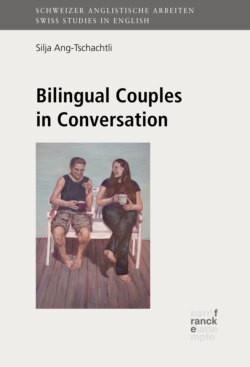Читать книгу Bilingual Couples in Conversation - Silja Ang-Tschachtli - Страница 41
На сайте Литреса книга снята с продажи.
5.2.4 Identity and language emotionality
ОглавлениеAs has been mentioned earlier, being bilingualbilingualindividuals and biculturalbiculturalindividuals may be important for the partners’ sense of couple identity (see section 3.3.2, “Bilingual couples”), but it may also be linked to aspects of individual identityidentityindividual.21 A number of studies indicate that fluent bilinguals talk, act, view or experience things differently in their two languages. For instance, Ervin-Tripp showed that bilinguals sometimes complete the same sentence differently (in terms of content) depending on which language they are using (1964: 96). Koven, who examined narratives of personal experiences by two Portuguese-French bilinguals, demonstrated that they perform different kinds of “selves” in their two languages (1998: 436). In a later study on a Portuguese-French woman, Koven (2004) found differences in the bilingual’s performanceperformingself of affect and self in her two languages. To give an example, the woman claimed to be quieter and more reserved in Portuguese than in French. Koven argues “that it is not the structural differences of the two languages that account for [her differing performances], but rather, the repertoire of personas to which this speaker has access in each language” (2004: 471). Similar results were obtained by Marian and Kaushanskaya (2004), who compared narratives of English-Russian bilinguals, and tried to determine the effect of their languages on self-construal and emotional expression. They discovered that speaking in English brings about “a more individualistic self-construal, whereas speaking Russian [results] in a more collectivist self-construal” (2004: 197). These findings suggest that bilinguals may have a preference for using one or the other of their languages to express or perform themselves in a certain way.
As a consequence, bilinguals sometimes feel that they have multiple or fragmented selvesidentitymultiple, as can be seen in Pavlenko’s analysis of the manner in which multilingual writers position themselves in autobiographical narratives. In their writing, these writers frequently present themselves as “agents whose multiple identities are dynamic and flexible” (2001a: 319). Pavlenko believes that
[the] notion of self as fluid, fragmented and multiple […] allows the authors to explore the links between multiple languages and selves in ways that were previously non-existent and/or impossible: challenging the essentialist notions of self, deconstructing various ethnic, national, colonial, and gender identities, creating new discourses of hybridity and multiplicity […]. (2001a: 339)
Since language has a close connection to our feelings, thoughts and self-image, not speaking one’s mother tongue may engender feelings of loss of identityidentityloss of. Pavlenko notes that “[d]iscourses of language and identity commonly present mother tongue as the language of the self, of the heart, of one’s ethnic, national, and cultural identity, and argue that losing one’s language is tantamount to losing one’s self” (2005: 200). In the case of bilingual couples, moreover, it has been claimed that “the choice to become fluent in the partner’s language is a symbol of willingness to give up one’s own culture and language-based self in order to get along with one’s partner” (Rosenblatt 2009: 14). A bilingual couple’s language choice may hence also be influenced by concerns of identity, sacrifice and assimilationassimilation.
Bilinguals may not just construct their identity differently in their two languages, they may also feel and interpret things differently, depending on which language they speak. Therefore, Wierzbicka suggests that being bilingual “means to live with two different sets of concepts, and through them, different ways of interpreting human relations” (2005: 15). She is of the opinion that different languages are not only linked to different manners of feeling and thinking, but that “they are linked with different attitudes, different ways of relating to people, different ways of expressing one’s feelings […]. They are linked with different ‘cultural scriptscultural script’, including ‘emotional scripts’” (2004: 98). The level of emotionality a language carries for a bilingual may thus have an effect on his or her language choice, both in general and in specific situations. This will be discussed in more detail in chapter 8, “‘In Swiss German, I lieb di, that’s strange’: Expressing emotions”.
